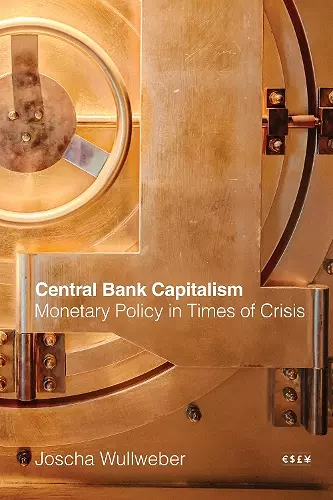Central Bank Capitalism
Monetary Policy in Times of Crisis
Format:Hardback
Publisher:Stanford University Press
Published:13th Aug '24
Currently unavailable, and unfortunately no date known when it will be back
This hardback is available in another edition too:
- Paperback£20.99(9781503639621)

Today's global financial system bears little resemblance to what it was at the end of the twentieth century. Shadow banking—financial activity taking place outside existing regulatory frameworks—has grown so important that it now serves as the backbone of the entire system. The shadow banking system, however, is highly unstable and the main reason why the financial system has remained in crisis mode since the 2008 financial crisis. To maintain stability, central banks like the Fed and the European Central Bank have come to use radical new monetary policy instruments which were inconceivable until very recently. Without intervention on the part of central banks, existing financial systems would completely collapse.
As Joscha Wullweber shows, there has been a radical change in the state-market nexus. With governments refraining from strong and comprehensive fiscal and financial regulatory policies, central banks have become the main stabilizing force and the nodal point of financial circulation. These overburdened institutions are called on to make near-daily interventions to avert crisis. Wullweber calls this historic phase central bank capitalism. His book offers a lucid account of our current state of permanent crisis with its new dilemmas and paradoxes that pose enormous challenges to financial and economic stability.
"Financial globalization is the significant fact of our age. Central Bank Capitalism foregrounds the role of central banks in enabling this development, and the challenge that political scientists face in integrating this into their understanding of governance."
—Perry Mehrling, author of The New Lombard Street
"Monetary theory and policy are shrouded in near-mystical language and ideas. Wullweber shines a bright light on both and in plain language reveals the interdependence of private capital markets, money markets, the shadow banking system and central banks."
—Ann Pettifor, author of The Case for the Green New Deal
"Wullweber offers a brilliant new perspective on the role of central banks in today's global economy. With deep empirical analysis, he sees a new regime emerging governed by powerful monetary authorities. Central Bank Capitalism is provocative and insightful."
—Benjamin J. Cohen, author of International Political Economy: An Intellectual History
"Central banks remain some of the most mysterious and important institutions of modern time. In this tour-de-force analysis, Wullweber unpacks their technocratic processes and shows them to be deeply political."
—Marieke de Goede, author of Speculative Security
"Central Bank Capitalism makes the reader understand why monetary policy is no longer boring—and why this is a problem for all of us."
—Waltraud Schelkle, author of The Political Economy of Monetary Solidarity
"Everyone should try to understand how and how much central banks are crucial for economics and politics, and this book is a great place to start. Even well-informed readers who've kept up with recent financial developments will have a great deal to learn from Wullweber's comprehensive vision of global financial politics."
—Roy Kreitner, author of Calculating Promises
"Recommended reading for anyone who wants to understand the workings of contemporary finance capitalism and the central role that central banks play in its perpetuation."
—Caspar Dohmen, Deutschlandfunk
"Wullweber takes us deep into the engine room of central banks - the institutions decisively responsible for steering today's economy. The great strength of his book lies in the fact that he does not stop at a (critical) description of financial market developments. Instead he points out why the situation evolved as it did, either because of inaction, mostly on the part of Western governments, or because of financial market deregulation."
—pro zukunft
ISBN: 9781503638969
Dimensions: unknown
Weight: unknown
258 pages